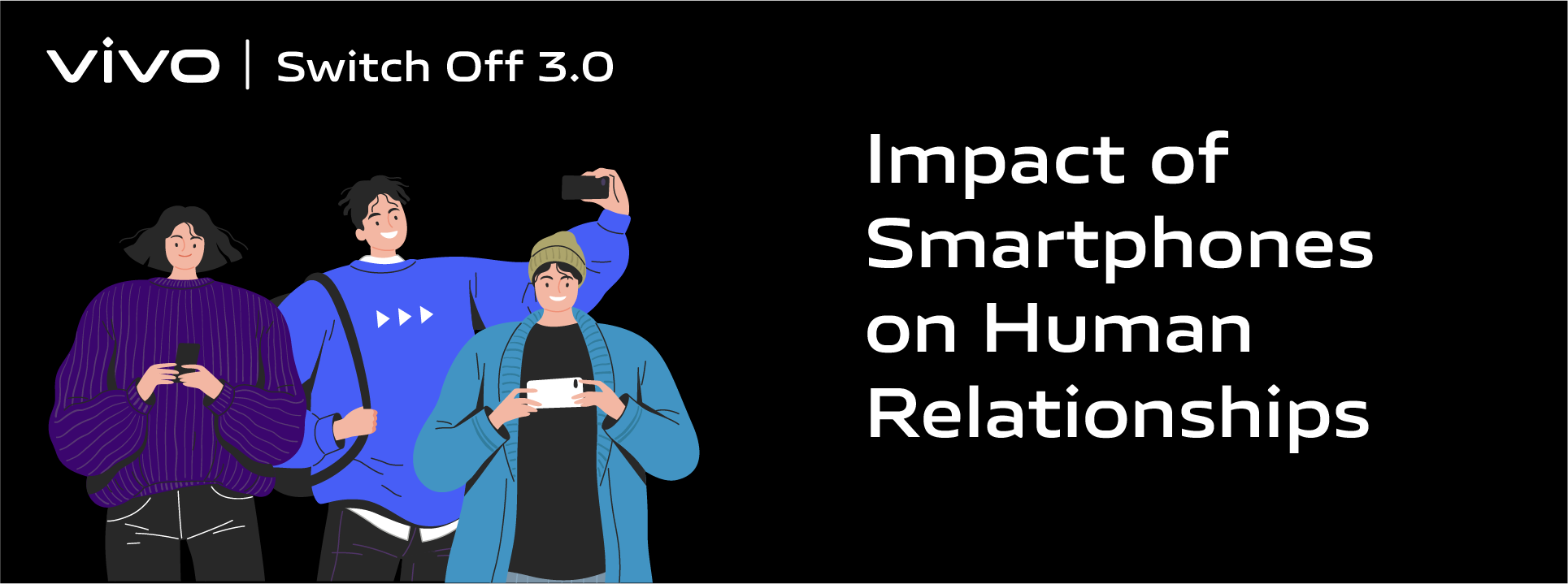74% parents confess that their excessive usage of smartphone has hurt their relationship with their kids - reveals vivo-SwitchOff 3.0 report
India, 13th December 2021

· 84% people agree that smartphones help them stay connected with their loved ones, boost their productivity and improve their quality of life
· 66% of Indian parents confess to always being on their smartphones while spending time with their kids
· 90% parents feel that their children are lacking in acceptable moral and social behaviour
vivo, the innovative global smartphone brand, today announced the findings of the third edition of the study titled 'Impact of Smartphones on Human Relationships 2021', focusing on the behavioral impact on children due to excessive use of mobile devices both by kids and their parents.
Conducted in association with Cybermedia Research (CMR), the study showcases the impact of smartphones on users and its effect on relationships. The third edition of Switch Off focusses on a unique angle of relationship dynamics especially in context to excessive use and all-pervasive presence of smartphones in our lives. The study sheds light on the various trends, patterns associated with smartphone usage and analyses the changing behavior of consumers.
Indeed, smartphones have become an essential tool in our day-to-day routine helping us connect with our friends and family in general. It became even more significant during Covid-19 and ensued lockdowns improving our overall quality of life and help us feel safe, secure and entertained at home. The study underlines that more that 80% of people agree that smartphones help boost their productivity and improve their quality of life. However, excessive usage of smartphones is triggering addiction among parents and that is hurting relationship with their kids.
The survey underlines that the average daily time spent on smartphones remains at alarming levels (in the post-Covid era) as there has been a 32% increase in the time spent on smartphones from the pre-Covid period. Interestingly, the survey also highlights that while the time that is spent with kids and family, in general, has gone up, the quality of time spent has deteriorated. 80% (Four in every five) smartphone users are on their phones even they're spending time with their kids, and a whopping 74% of Indian parents feel that their relationship with their kids may be hurt because of smartphones.
This has its ramifications on the psychological and cognitive development of children. 90% of parents confess that their children display signs of aggression due to their extended smartphone usage. The same number of parents feel that their children are sometimes lacking in acceptable moral and social behaviour.
Commenting on the launch of the report, Yogendra Sriramula, Director, Brand Strategy, vivo India, said, "It is an undisputed fact that smartphones have become an integral part of our lives, helping us stay connected with work and social circles, giving us access to information and improving our productivity. However, their excessive use is impacting human relationships and behaviour. The vivo study in 2019 and 2020 focused on the broad impact on relationships. In the 2021 vivo CMR study, we wanted to ask the parents something their unconscious mind may already know - is their excessive use of smartphones hampering their relationship with their kids and impacting their psychological and cognitive development?
As a brand that wants to bring joy to people, this study is indeed a message to the parents that they should be mindful of their smartphone use, particularly while using them with their kids."
Some of the key findings of the study are as below:
Smartphones impact on human relationships- Obsession of smartphones is climbing the ladder, and decreasing attention spans are evident. While the time that we spend with our kids and family has gone up by 57% and 49% respectively, the quality of time spent has deteriorated.
· 66% confess to being on their smartphones while spending time with their kids.
· 74% of Indian parents feel that feel that their relationship with their kids maybe hurt because of smartphones.
· 75% admit to having been distracted by their smartphones and not being attentive to kids even while with them
· 69% of people believe that they lose track of children, surroundings, and people when they are immersed in their smartphones, and 74% admit to getting irritated when their children ask them something.
Impact of parents' excessive usage of smartphones on children's behavior- Smartphones are impacting everyday interactions and it's a noticeable impact on kids, where uninterrupted time and attention are leading to visible behavioral changes in children:
· 90% of parents confess that their children display some signs of aggression owing to their extended smartphone usage
· 85% of parents feel that their children find it difficult to mix with other kids in a social setting and the overall outdoor experience to be daunting.
· 90% of parents feel that their children are sometimes found to be lacking in acceptable moral and social behavior
Impact of COVID-19- Today, smartphones are integral to everyday function and in a pandemic impacted world, they are integral to our existence
· Consumers claim to spend an average of 6.5 hours on their smartphone per day, a 32% increase from the pre-COVID era.
Smartphone Addiction– Literally, the smartphone is the place where we live. Our smartphones are our digital home. While more than 80% people think that smartphones help them stay connected with their loved ones and improve their quality of life but;
· 94% of people agree that the smartphone has become a part of their bodies and they cannot separate from them.
· The overall dependency on phones has increased and there is no sacred space, people use their phones while eating food (70%), in the living room (72%), and even while sitting with family (75%).
Parents Desire- It's imperative to #SwitchOff and connect in an old-school way:
· 95% of respondents accept that they would love to spend more uninterrupted time with their children.
About the study:
The third edition of the report titled 'Smartphones and Human Relationships' is based on a study commissioned by vivo, a leading global technology company committed to creating trendsetting smart mobile products and services. The study was executed by CyberMedia Research (CMR), India's trusted market research and advisory firm, covering 1100 consumers, across age-groups and demographics, in the top 8 cities in India viz., New Delhi, Mumbai, Kolkata, Bengaluru, Chennai, Hyderabad, Ahmedabad, Pune.
About vivo
vivo is a technology company that creates great products based on a design-driven value, with smart devices and intelligent services as its core. The company aims to build a bridge between humans and the digital world. Through unique creativity, vivo provides users with an increasingly convenient mobile and digital life. Following the company's core values, which include Benfen*, design-driven value, user-orientation, continuous learning and team spirit, vivo has implemented a sustainable development strategy with the vision of developing into a healthier, more sustainable world-class corporation.
While bringing together and developing the best local talents to deliver excellence, vivo is supported by a network of 10 R&D centers in Shenzhen, Dongguan, Nanjing, Beijing, Hangzhou, Shanghai, Xi'an, Taipei, Tokyo and San Diego, focusing on the development of state-of-the-art consumer technologies, including 5G, artificial intelligence, industrial design, photography and other up-and-coming technologies. vivo has also set-up seven production bases (including brand-authorized manufacturing centers), across China, South- and Southeast Asia, and more regions, with an annual production capacity of nearly 200 million smartphones. As of now, vivo has branched out its sales network across more than 50 countries and regions and is loved by more than 400 million users worldwide.
"Benfen" is a term describing the attitude on doing the right things and doing things right – which is the ideal description of vivo's mission to create value for society.




























